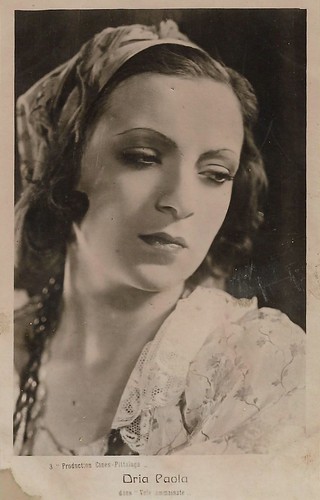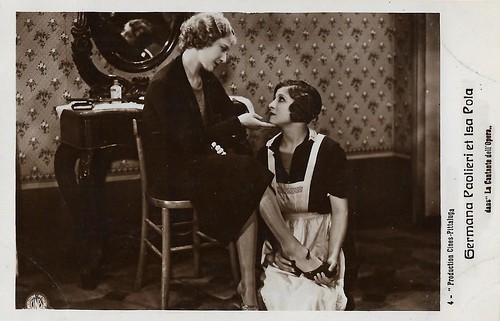Today and tomorrow, EFSP does two posts on postcards Ivo Blom acquired last month at the Il Cinema Ritrovato Book Fair in Bologna. Tomorrow a film special on the Italian silent drama Zingari (1920), starring Italia Almirante Manzini, but we start with a post on Italian postcards from the early 1930s.
All the postcards were published by the film company Cines-Pittaluga to promote their own films. The head of this company, Stefano Pittaluga (1887-1932) helped revive Italian film production in the late 1920s and early 1930s. In 1926, he acquired the pioneering film studio Cines from the conglomerate Unione Cinematografica Italiana. Cines produced the first Italian sound film La canzone dell'amore/The Song of Love (1930), and became the dominant force of the early sound era. Under Pittaluga the company specialised in musicals and comedies, of which many were later branded 'Telefoni Bianchi' (White Telephone films). After Pittaluga's sudden death in 1932 the company continued to release the same kind of populist films, and Cines-Pittaluga was only overtaken when the Fascist government of Benito Mussolini invested large sums of money in production and constructed the vast Cinecittà complex in Rome.

Italian postcard by Cines-Pittaluga, no. 3. Dria Paola in Vele ammainate/Lowered Sails (Anton Giulio Bragaglia, 1931).

Italian postcard by Cines-Pittaluga, no. 5. Carlo Fontana in Vele ammainate/Lowered Sails (Anton Giulio Bragaglia, 1931).

Italian postcard by Cines-Pittaluga, no. ? Dria Paola and Carlo Fontana in Vele ammainate/Lowered Sails (Anton Giulio Bragaglia, 1931).

Italian postcard by Cines-Pittaluga, no. 115. Photo: Cines-Pittaluga. Amerigo Bomprezzi in Vele ammainate/Lowered Sails (Anton Giulio Bragaglia, 1931).
All the postcards were published by the film company Cines-Pittaluga to promote their own films. The head of this company, Stefano Pittaluga (1887-1932) helped revive Italian film production in the late 1920s and early 1930s. In 1926, he acquired the pioneering film studio Cines from the conglomerate Unione Cinematografica Italiana. Cines produced the first Italian sound film La canzone dell'amore/The Song of Love (1930), and became the dominant force of the early sound era. Under Pittaluga the company specialised in musicals and comedies, of which many were later branded 'Telefoni Bianchi' (White Telephone films). After Pittaluga's sudden death in 1932 the company continued to release the same kind of populist films, and Cines-Pittaluga was only overtaken when the Fascist government of Benito Mussolini invested large sums of money in production and constructed the vast Cinecittà complex in Rome.
Vele ammainate (1931)

Italian postcard by Cines-Pittaluga, no. 3. Dria Paola in Vele ammainate/Lowered Sails (Anton Giulio Bragaglia, 1931).

Italian postcard by Cines-Pittaluga, no. 5. Carlo Fontana in Vele ammainate/Lowered Sails (Anton Giulio Bragaglia, 1931).

Italian postcard by Cines-Pittaluga, no. ? Dria Paola and Carlo Fontana in Vele ammainate/Lowered Sails (Anton Giulio Bragaglia, 1931).

Italian postcard by Cines-Pittaluga, no. 115. Photo: Cines-Pittaluga. Amerigo Bomprezzi in Vele ammainate/Lowered Sails (Anton Giulio Bragaglia, 1931).

Italian postcard by Cines-Pittaluga, no. 146. Dria Paola in Vele ammainate/Lowered Sails (Anton Giulio Bragaglia, 1931).
The Italian melodrama Vele ammainate/Lowered Sails (1931) is the only sound film by former Futurist artist Anton Giulio Bragaglia. The film was made at the Cines studio in Rome, and the outdoors scenes were shot in Savona. Dria Paola, star of La canzone dell'amore/The Song of Love (Gennaro Righelli, 1930), played the lead role and little known Carlo Fontana was her co-star. Fontana only appeared in a few Italian sound films and also one silent German film.
La cantante dell'opera (1932)

Italian postcard by Cines-Pittaluga, no. 4. Germana Paolieri and Isa Pola in La cantante dell'opera/The opera singer (Nunzio Malasomma, 1932).

Italian postcard by Cines-Pittaluga, no. 6. Germana Paolieri and Isa Pola in La cantante dell'opera/The opera singer (Nunzio Malasomma, 1932).

Italian postcard by Cines-Pittaluga, no. 22. Postcard for La cantante dell'opera/The opera singer (Nunzio Malasomma, 1932). The man on the right is Gianfranco Giachetti as the waiter Papussa.
In the drama La cantante dell'opera/The opera singer (Nunzio Malasomma, 1932), daughter Lina (Germana Paolieri) distances herself from her humble home and leaves for new horizons. Her father, the poor and old waiter Papussa (Gianfranco Giachetti), has worked all his life, so that his daughter could perfect her singing. When he is gradually separated from her while she gains new triumphs, his father heart is hurt. For the sake of his daughter, he even pretends to not recognising her, so that she does not look humiliated in front of her fiance and his family. But providence returns to the troubled father the affection of his child.
La tavola dei poveri (1932)

Italian postcard by Cines-Pittaluga, no. 42. Postcard for La tavola dei poveri/The table of the poor (Alessandro Blasetti, 1932). On the left Raffaele Viviani as Marquis Isidoro Fusaro, on the right Mario Ferrari as attorney Volterra.

Italian postcard by Cines-Pittaluga, no. 43. Postcard for La tavola dei poveri/The table of the poor (Alessandro Blasetti, 1932). In the middle Leda Gloria as Giorgina Fusaro, on the right Mario Ferrari as attorney Volterra.
La tavola dei poveri/The table of the poor (Alessandro Blasetti, 1932) is based on a one-act play by Raffaele Viviani, in which an impoverished Marquis (Viviani), president of a charity society, is trying to keep up decorum by selling all his valuables. When a beggar (Salvatore Costa) gives him his savings of 30 years of begging in custody, the society thinks it is a gift by the Marquis and takes it. The penniless Marquis now quickly needs to find a way to repay the beggar.
O la borsa o la vita (1933)

Italian postcard by Cines-Pittaluga, no. 26. Sergio Tofano, Rosetta Tofano and Luigi Almirante in O la borsa o la vita/Your money or your life (Carlo Ludovico Bragaglia, 1933). Aviation stuntman Mario De Bernardi performed acrobatic loops for the film. This card suggests everybody is looking at the aerial stunts.
In the comedy O la borsa o la vita/Your money or your life (Carlo Ludovico Bragaglia, 1933), a man receives a large sum of money from a friend so that he can invest it, but due to a stock exchange collapse, he believes he has lost everything, so he tries every means of death to allow his friend to collect the insurance. But the various attempts (being invested by a car, ending up in the lion's den at the zoo, performing a dangerous mission on behalf of a group of anarchists - in reality, lunatics escaped from an asylum) are in vain, life does not give up. Until his friend reaches him in a tavern: the shares in which he invested have risen sharply, allowing him to earn an even more substantial sum. The film was based on a radio play by Alessandro De Stefani.
Sources: Wikipedia and IMDb.
No comments:
Post a Comment